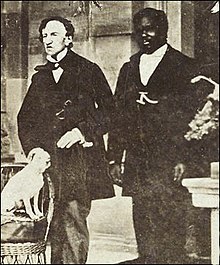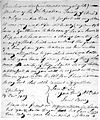James Barry
James Barry (born November 9, 1795 in Belfast , Northern Ireland , † July 25, 1865 in London ) was a doctor in the English army. He served in India and South Africa, not only improving the conditions for the wounded soldiers, but also working to change the living conditions of the local population. One of his successes is the first successful cesarean section in all of Africa; The mother and child survived the operation.
It is widely believed that Barry was transgender , but possibly just lived as a man to be accepted into university and pursue his chosen career as a doctor and surgeon.
Life
youth
Barry's exact date of birth is unknown. Some sources state 1792 while others assume 1795 or even 1789. Information about Barry's early life is scarce and riddled with myth and speculation. Some believe that his original name was Miranda Stuart . However, new evidence suggests that Barry was born Margaret Ann Bulkley in Ireland and that his parents were named Jeremiah and Mary-Ann Bulkley. His mother was therefore a sister of James Barry , the Irish artist and professor of painting at the London Royal Academy . Barry must have covered up his real age as well. The reasons he lived as a man may have been because it was practically impossible for women to become doctors at that time, especially in the army. Letters reveal a plot between Barry's mother and some of his uncle's influential, liberal friends to get him in and through medical school.
Career
Barry was accepted to the University of Edinburgh as a student of literature and medicine in 1809 , graduating with a doctorate in medicine in 1812. In 1813 he received a commission as an assistant doctor in the British Army. It could have been used in the Battle of Waterloo . He then served in India and South Africa . He arrived in Cape Town between 1815 and 1817 .
After a few weeks he became the medical inspector for the colony . During his stay, he took care of the improvement of the water system in Cape Town and performed one of the first known successful caesarean sections - the boy was baptized James Barry Munnik. He made enemies because he criticized the nature of the medical care. He left Cape Town in 1828.
His next posts were in Mauritius in 1828, Trinidad and Tobago and the island of Saint Helena , among others . In Saint Helena he got into trouble when he left for England without permission. He later served in Malta , Corfu , Crimea , Jamaica and, in 1831, Canada .
By this time he had attained the rank of Inspector General for Army Hospitals. During his time in Sankt Helena he got into trouble because of the island's domestic politics, was arrested, sent home and demoted to the position of medical officer . His next position was in the West Indies in 1838.
There he focused on medicine, management and improving the living conditions of the troops. He was promoted to Principal Medical Officer . In 1845 he fell ill with yellow fever and went back to England in October to recover.
Barry was stationed in Malta on November 2, 1846 . In the first month after his arrival, he occupied a seat in the church that was reserved for the clergy and was severely admonished as a result. During his stay in 1850 he had to deal with a cholera epidemic .
He left Malta in 1851 to go to Corfu with the rank of Deputy Inspector-General of Hospitals . He left Corfu again in 1857 and went to Canada as Inspector-General of Hospitals .
James Barry retired in 1864 - allegedly against his wishes - and returned to England. He died on July 25, 1865 of diarrhea.
Presumably one of the day laborers, the maid Sophia Bishop, who was supposed to take care of the body, was the first to discover his female body. One of them even claimed to have recognized stretch marks. Afterwards, many people declared that they had always known something .
He was buried in Kensal Green Cemetery , with his full rank and by the only name by which he was known. His servant John returned to Jamaica.
character
Barry wasn't always a pleasant person to be around. He could be tactless, impatient, argumentative, and stubborn. He has reportedly fought in a few duels when someone made comments about his voice, shape or professional ability. He was punished several times for insubordination and rude behavior, but always got away with light penalties. During the Crimean War (1854-1856) he got into a dispute with Florence Nightingale .
He does seem to have had good patient behavior and professional skills, however. Wherever he was stationed, he tried to improve the living conditions of the common soldiers and the sanitary conditions. He reacted indignantly to unnecessary suffering. His insistence on better living conditions for the poor and common people bothered both the quacks and his superiors. He was a vegetarian and a teetotaler . His dogs and his black servant John were his constant companions.
Literature in English
- Lauren Beukes : Maverick: Extraordinary Women From South Africa's Past
- Sydney Brandon: 'Barry, James (c.1799-1865)', Oxford Dictionary of National Biography, Oxford University Press, Sept 2004; online edn, Jan 2008 accessed 4 Aug 2008 ; ODNB in notes.
- Patricia Duncker : James Miranda Barry (historical novel)
- Patricia Duncker: The Doctor
- Rachel Holmes: Scanty Particulars: The Scandalous Life and Astonishing Secret of James Barry, Queen Victoria's Most Eminent Military Doctor
- Kronenfeld, Anne and Ivan: The Secret Life of Dr. James Miranda Barry (historical novel)
- Racster, Olga: Dr. James Barry: Her secret story
- Rae, Isobel: The Strange Story of Dr. James Barry: Army Surgeon, Inspector-General of Hospitals, Discovered on Death to be a Woman
- Robb, Colin Johnston: The Woman Who Won Fame in the British Army as a Man (Article published in 'The Northern Whig and Belfast Post', Friday November 16th, 1846)
- Rose, June: The Perfect Gentleman
- Town, Florida Ann: With a Silent Companion (historical novel for 12 to 16 year olds) ISBN 0-88995-211-6
gallery
literature
- Dr. Barry's PhD thesis (Latin, English)
- M. Alsberg: The mysterious doctor . In: The Gazebo . Issue 52, 1867 ( full text [ Wikisource ]).
- Helen Sweet: The Cape Doctor in the Nineteenth Century: A Social History . In: The Social History of Medicine , December 2005, 18, pp. 504-506
Web links
- Literature by and about James Barry in the catalog of the German National Library
- Van Hunks: The Mysterious Doctor James Barry
- Howard Phillips, Home Taught for Abroad: The Training of the Cape Doctor, 1807-1910 . In: Wellcome Series in the History of Medicine
- Dr. Barry's grave site
Individual evidence
- ↑ a b Stephanie Pain: The 'male' military surgeon who wasn't . In: NewScientist.com . March 6, 2008. Retrieved March 16, 2008.
- ↑ James Barry Biography . In: Dictionary of Canadian Biography . Retrieved December 23, 2007.
- ↑ a b Christoph Fuhr: Women who conquered the world of medicine. In: Doctors newspaper , October 13, 2010, aerztezeitung.de
- ↑ a b Annette Kerckhoff : Healing Women. Elisabeth Sandmann Verlag, Munich 2010, ISBN 978-3-938045-47-3 , pp. 22-23
- ↑ a b c Hercules Michael du Preez: Dr James Barry: The early years revealed . In: South African Medical Journal, Vol 98, No 4 (2008) . SAMJ. January 14, 2008. Retrieved April 3, 2008.
| personal data | |
|---|---|
| SURNAME | Barry, James |
| BRIEF DESCRIPTION | Doctor in the British Army |
| DATE OF BIRTH | November 9, 1795 |
| PLACE OF BIRTH | Belfast , Northern Ireland |
| DATE OF DEATH | July 25, 1865 |
| Place of death | London |





